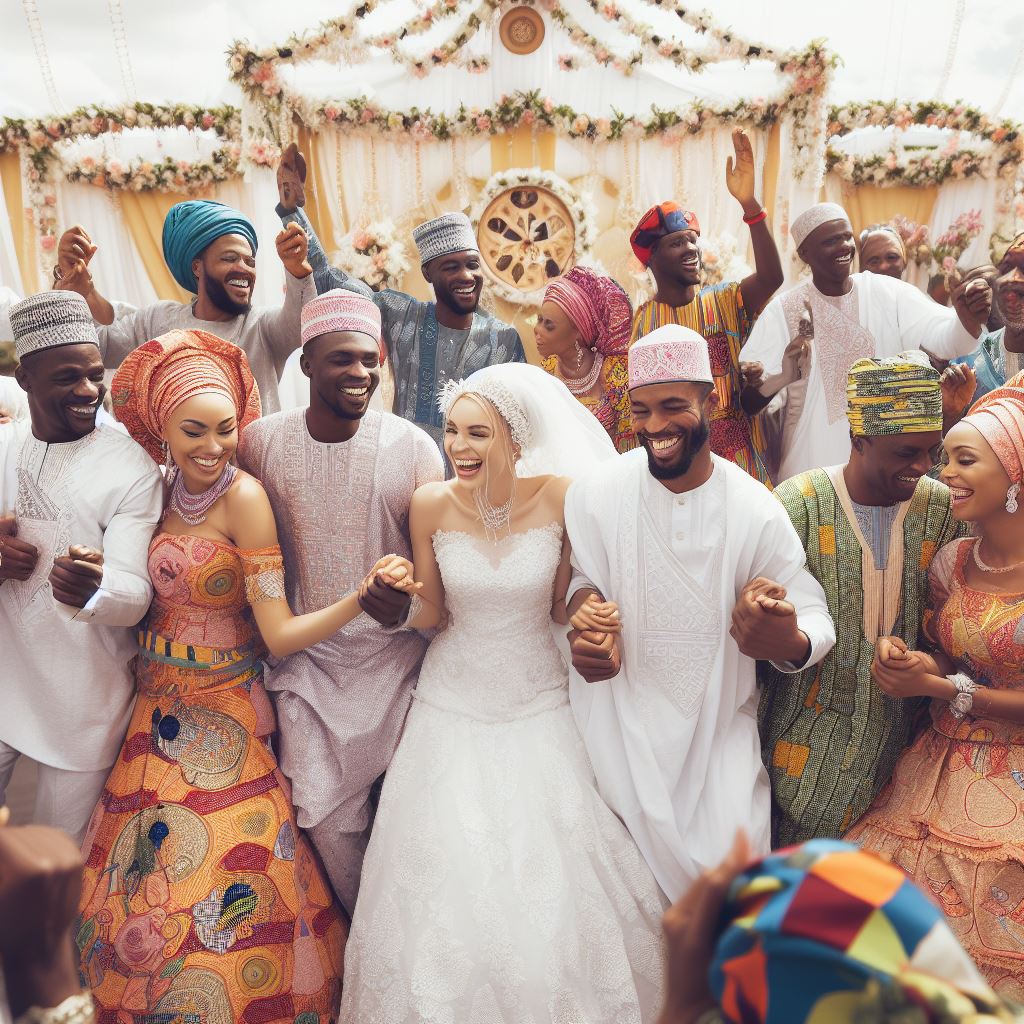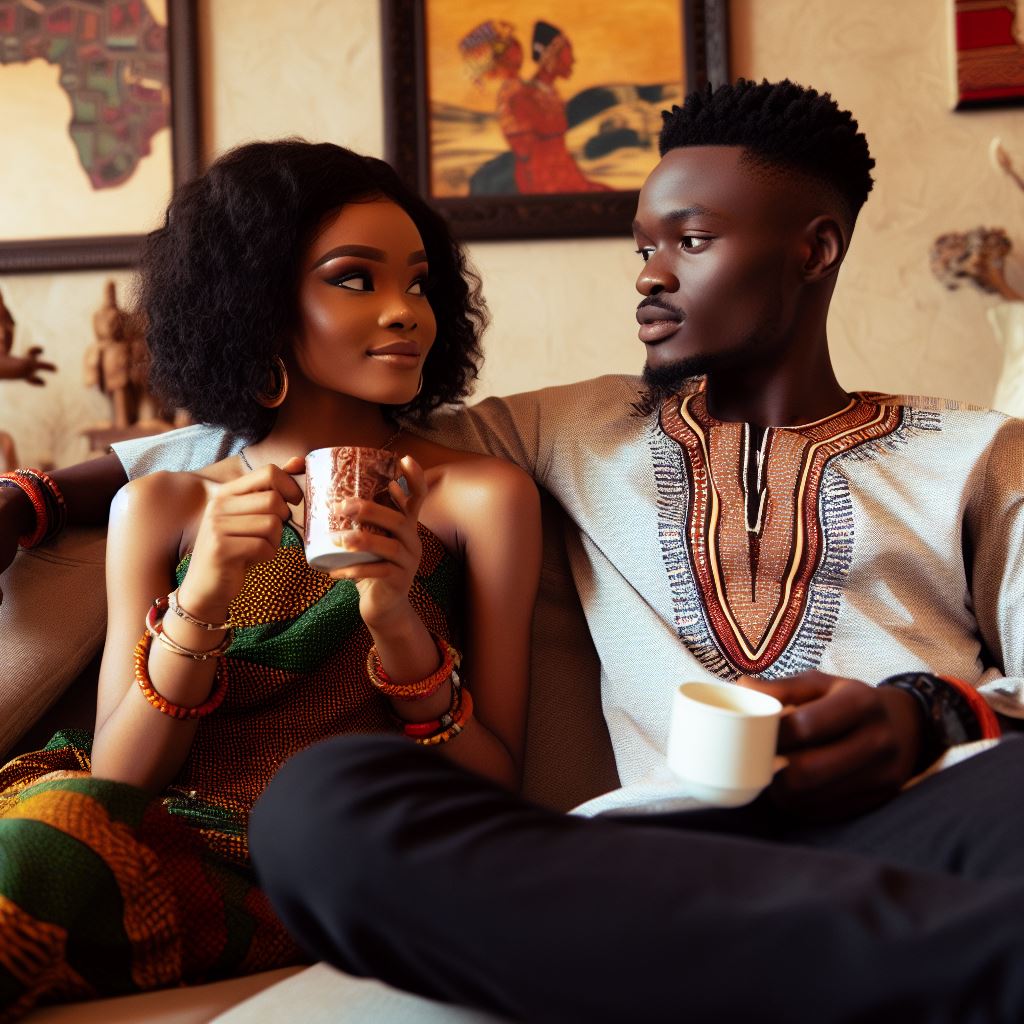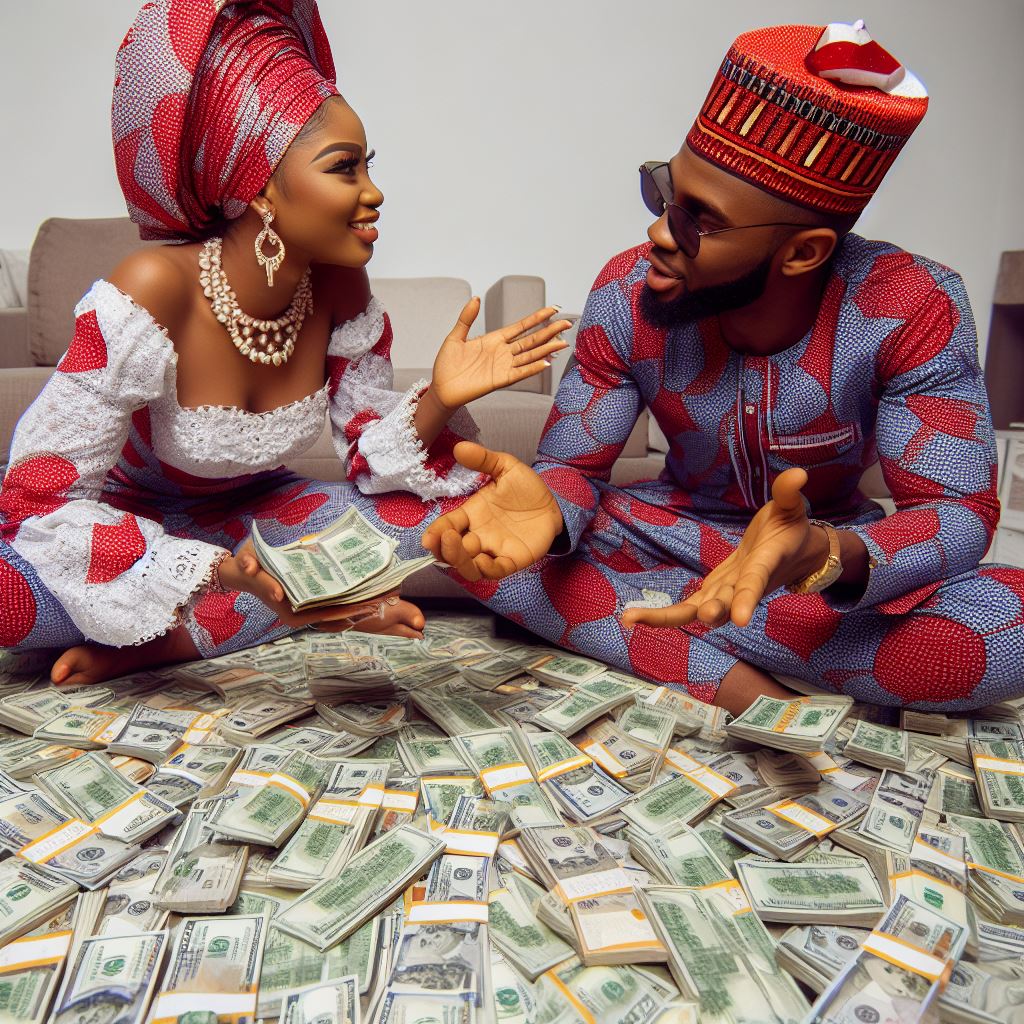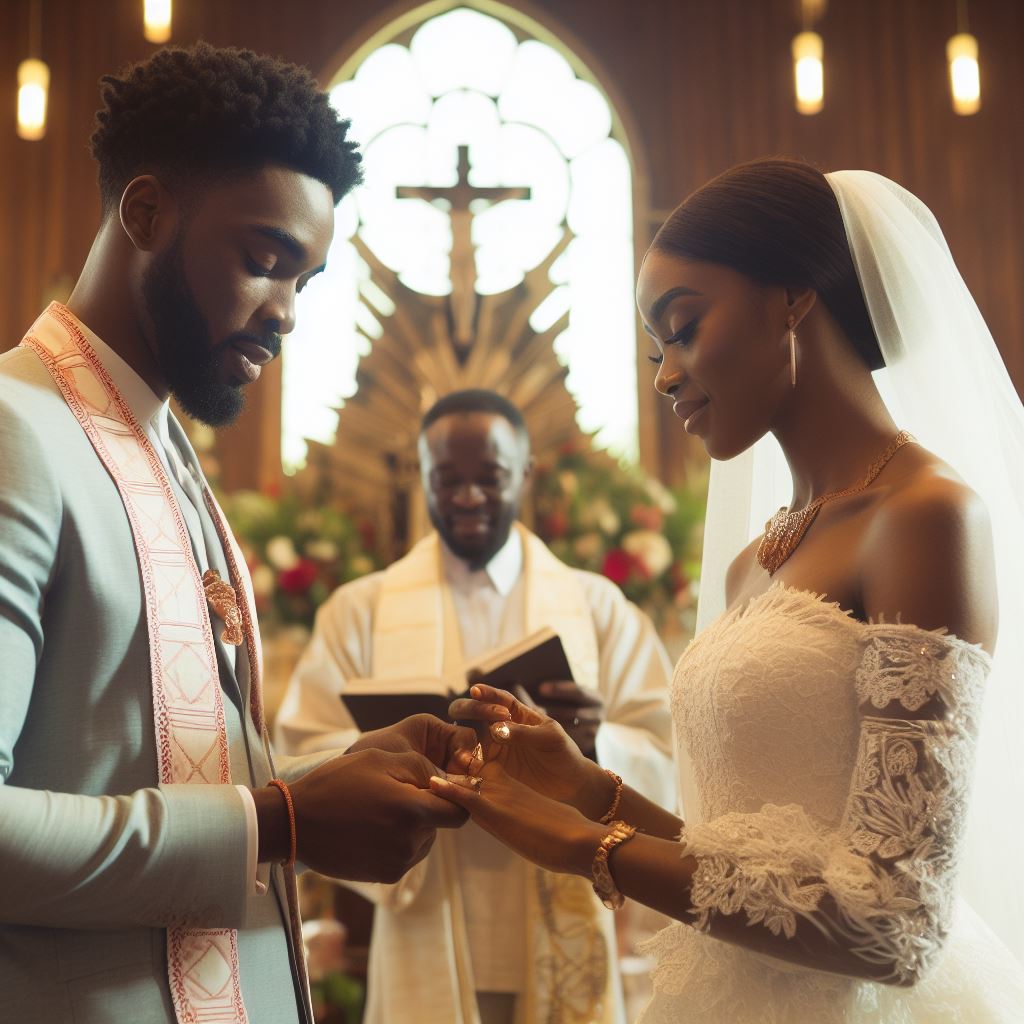Introduction
Nigerian nuptials are a celebration of love and union, deeply rooted in rich cultural traditions. Balancing tradition and modernity is crucial in preserving these sacred ceremonies.
In Nigerian culture, weddings are more than just a union of two individuals.
They are a union of families, a coming together of communities, and an opportunity to showcase a nation’s heritage.
However, as society evolves, so do wedding trends. Nigerian couples find themselves navigating the delicate balance between honoring their cultural traditions and embracing modern ideas.
This balance is essential as it ensures that the essence of Nigerian weddings remains intact while allowing room for personal expression and innovation.
Modern Nigerian couples are incorporating elements of their heritage, such as traditional attire, dances, and rituals, into their wedding ceremonies.
By doing so, they pay homage to their roots while celebrating their union in a unique and meaningful way.
At the same time, they are also incorporating modern elements, such as contemporary wedding venues, personalized vows, and trendy decor.
These additions add a touch of modernity to the festivities, making them relevant for the younger generation.
Finding the perfect equilibrium between tradition and modernity requires open-mindedness and flexibility from both the couple and their families.
It is a delicate dance that requires careful consideration, compromise, and a deep appreciation for the significance of both aspects.
In a world that is becoming increasingly globalized, Nigerian nuptials serve as a reminder of the importance of preserving cultural traditions while embracing changes that come with modernity.
In this blog post, we will delve deeper into the various ways in which Nigerian couples manage to strike this balance, offering insights into the unique and vibrant world of Nigerian nuptials.
Traditional Nigerian Wedding Customs
A. Significance of Traditional Customs
Nigerian weddings beautifully blend tradition and modernity, emphasizing the enduring importance of cultural customs.
These customs form the backbone of Nigerian nuptials, connecting couples to their heritage and strengthening family bonds.
B. Various Customs and Rituals
- Engagement Ceremony: This event symbolizes the union of two families. It involves the formal introduction of the couple.
- Bride Price: In many Nigerian cultures, the groom must negotiate and pay a bride price to the bride’s family.
- Traditional Attire: The bride and groom wear exquisite traditional garments, often representing their ethnic backgrounds.
- Dancing and Music: Music and dance are integral to Nigerian weddings, adding rhythm and color to the celebration.
C. Examples of Specific Traditions
- Engagement Ceremony: Families exchange gifts and blessings, signifying the couple’s commitment.
- Bride Price: The negotiation can be a heartfelt gesture, symbolizing the groom’s ability to provide for his future wife.
- Traditional Attire: Brides dazzle in intricate dresses like the Yoruba’s “iro and buba” or the Igbo’s “gele.”
Nigerian weddings uniquely capture the essence of cultural heritage, making each celebration a vibrant tapestry of tradition and modernity.
Impact of Modern Influences on Nigerian Weddings
Modernization and globalization have brought significant changes to Nigerian wedding practices.
Western wedding traditions have gained a noticeable influence on Nigerian nuptials.
Factors driving the adoption of modern elements in Nigerian weddings include:
A. Changing Social Dynamics
- As Nigerian society becomes more urban and cosmopolitan, traditions are evolving to reflect modern values.
- Younger generations are increasingly exposed to Western culture through media and education.
- This exposure leads to a desire to incorporate Western wedding elements into Nigerian ceremonies.
B. Economic Factors
- The Nigerian middle class is growing, allowing for more elaborate and extravagant weddings.
- Increased disposable income enables couples to invest in modern wedding customs and trends.
- The wedding industry has expanded, creating a market for modern wedding products and services.
C. Desire for Individualization
- Modernization has given Nigerians access to a variety of wedding ideas and themes.
- Couples now prioritize personalization and uniqueness in planning their weddings.
- They incorporate modern elements to distinguish their ceremonies from traditional ones.
D. Influence of Social Media
- Platforms like Instagram, Pinterest, and Facebook have revolutionized wedding planning and inspiration.
- Nigerian couples use social media to explore global wedding trends and adapt them to their culture.
- This exposure to modern wedding ideas encourages the adoption of new practices.
E. International Exposure
- Increased global travel and migration have exposed Nigerians to weddings from different cultures.
- Couples who have attended or been part of international weddings often bring back ideas to incorporate into their own.
- This cross-cultural exchange fuels the integration of modern elements in Nigerian nuptials.
F. Signaling Social Status
- Incorporating modern elements into weddings is seen as a sign of affluence and social influence.
- Showcasing expensive venues, designer wedding attire, and trendy decorations demonstrates wealth.
- By adopting modern practices, couples aim to position themselves as fashionable and influential.
In fact, the impact of modern influences on Nigerian weddings is significant.
Modernization, globalization, changing social dynamics, economic factors, desire for individualization, influence of social media, international exposure, and signaling social status all contribute to the adoption of modern elements in Nigerian nuptials.
As Nigerian society continues to evolve, the blend of tradition and modernity in weddings will continue to shape the cultural landscape.
Read: Harmonizing Love and Faith: Nigerian Couple’s Anniversary Prayer Rituals
Challenges in Balancing Tradition and Modernity
When it comes to Nigerian weddings, finding the delicate balance between tradition and modernity can pose several challenges.
Couples, families, and communities often face obstacles while blending traditional and modern aspects in these sacred ceremonies.
A. Challenges faced by couples, families, and communities in blending traditional and modern aspects in Nigerian weddings
Let’s explore some of these challenges:
- Differences in preferences and expectations can lead to conflicts among couples and their families.
- The clash between traditional beliefs and modern values may create tensions and misunderstandings.
- Pressure from the older generation to uphold traditional customs can create friction with younger individuals.
- Financial constraints can limit the extent to which couples can incorporate both traditional and modern elements.
- Traditional customs might be seen as outdated or irrelevant by those who prefer a more modern celebration.
- Deciding which traditions to include or modify can become a source of disagreement for the couple.
- Societal expectations and judgment can make individuals feel torn between adhering to tradition and embracing modernity.
- The fear of losing cultural identity can cause individuals to resist incorporating modern elements into their weddings.
- Planning a wedding that satisfies both the need for tradition and the desire for modernity requires careful negotiation.
- Balancing the wishes of both sets of families, who often hold different ideas about what a wedding should entail, can be challenging.
B. Potential cultural dilemmas and pressures faced by individuals who opt for more modern ceremonies
These challenges highlight the complexity of finding harmony between tradition and modernity in Nigerian nuptials.
Cultural dilemmas and pressures are particularly faced by individuals who opt for more modern ceremonies:
- Families and communities may criticize couples who deviate too far from traditional customs.
- Individuals who embrace a more modern approach might face judgment and exclusion from their own community.
- There can be a fear of being seen as too Westernized or losing touch with one’s Nigerian heritage.
- Modern weddings may be more costly, making it difficult for individuals with limited financial resources.
- Striking a balance between tradition and modernity without compromising cultural significance can be a daunting task.
In short, the challenges in balancing tradition and modernity in Nigerian weddings are vast and varied.
Couples, families, and communities must navigate conflicting preferences and expectations while preserving cultural heritage.
The fear of judgment and the pressure to conform further complicate this delicate equilibrium.
However, by engaging in open communication, understanding, and compromise, it is possible to create weddings that authentically blend tradition and modernity.
Read: How Religion Impacts Marriage Counseling in Nigeria

Explore Further: Nigeria’s Marriage Laws: What Every Couple Should Know
Successful Examples of Balancing Tradition and Modernity
A. Stories of Nigerian couples who have successfully incorporated traditional and modern elements in their weddings
- Nigerian weddings have witnessed remarkable success stories when it comes to balancing tradition and modernity.
- One such couple, Ada and Chinedu, beautifully merged their cultural roots with contemporary wedding trends.
- Ada incorporated her Igbo heritage by wearing a stunning coral beads necklace and a traditional coral-patterned blouse.
- Chinedu, on the other hand, showed his modern side by donning a stylish suit with a touch of African print.
- They combined both traditions by exchanging traditional vows while adding personal touches to their ceremony.
- Another inspiring example is the wedding of Fatima and Ahmed, who embraced their Hausa and Yoruba backgrounds.
- Fatima stunned everyone with her vibrant and intricately designed henna patterns, a symbol of Hausa tradition.
- Ahmed showcased his modernity by surprising Fatima with a choreographed dance performance during the reception.
- The wedding was a perfect blend of traditional elements and contemporary entertainment.
- These stories highlight the success of couples who have flawlessly blended tradition and modernity.
B. Innovative ways of blending the old and the new to create unique wedding experiences
- Nigerian weddings have also seen a rise in innovative ways of merging the old and the new.
- One couple, Ngozi and Tunde, incorporated a traditional “money dance” with a modern twist.
- Instead of traditional cash, guests used e-payment options, symbolizing the fusion of tradition with modern technology.
- Another couple, Amina and Emeka, introduced a photo booth where guests could take pictures with both traditional and modern props.
- The blending of traditional attires with funky accessories made for a fun and unique experience.
- These creative ideas showcase how couples are redefining wedding customs to better reflect their dual identities.
C. Positive outcomes and the overall acceptance of such weddings by the Nigerian society
- Successful examples of balancing tradition and modernity in Nigerian weddings have been widely accepted and celebrated.
- Nigerian society has embraced the idea of merging cultural heritage with modern trends.
- Such weddings are seen as an appreciation of both the past and the present, and a celebration of diversity.
- The positive outcomes of these weddings include fostering cultural pride, creating an inclusive atmosphere, and bringing families together.
- Instead of being seen as conflicting forces, tradition and modernity are now seen as complementary aspects of Nigerian weddings.
- Overall, the acceptance and appreciation of such weddings reflect the evolving nature of Nigerian society.
- It signifies a shift towards embracing both tradition and modernity without compromising on cultural values.
- Nigerian nuptials, through successful examples, have become a testament to the harmonious coexistence of tradition and modernity in today’s world.
- These weddings serve as inspiration for future couples looking to strike the perfect balance between their cultural heritage and contemporary influences.
Read: Cost of Marriage Counseling in Nigeria: Budgeting for Harmony
Recommendations for Achieving a Balanced Nigerian Nuptial
A. Suggestions for couples, families, and wedding planners on how to strike a balance between tradition and modernity
- Research and understand the cultural significance of different wedding traditions in Nigeria.
- Discuss and prioritize which traditions are most important for both families, and be open to compromise on others.
- Seek guidance from elders or cultural experts to ensure that traditional customs are respected and incorporated in a meaningful way.
- Consider combining traditional elements with modern trends to create a unique and personalized wedding experience.
- Incorporate traditional Nigerian attire, such as the gele and agbada, alongside modern fashion choices.
- Arrange for a traditional engagement ceremony, followed by a more modern wedding reception to satisfy both cultural and contemporary expectations.
- Encourage couples to express their own preferences and desires for the wedding, while also considering their families’ input.
B. Encouraging open communication and compromise between all parties involved
- Facilitate open, honest, and respectful discussions between the couple, their families, and wedding planners.
- Ensure that all parties have the opportunity to express their opinions and concerns regarding the wedding traditions.
- Encourage active listening and empathy to foster understanding and find common ground.
- Consider a mediator, such as a wedding planner, to help facilitate the negotiation process.
- Build a plan that respects each party’s wishes while finding compromises that maintain harmony and inclusivity.
C. The importance of preserving cultural heritage while embracing new trends
- Educate couples and families about the importance of preserving Nigerian cultural heritage through wedding traditions.
- Highlight the significance of these traditions in maintaining cultural identity and fostering a sense of belonging.
- Encourage the use of traditional Nigerian music, dance, and food during wedding celebrations.
- Promote the inclusion of cultural rituals, such as the kola nut presentation and the breaking of the bitter kola.
- Emphasize that embracing new trends does not mean abandoning or erasing cultural practices, but rather finding a harmonious synthesis.
- Celebrate the diversity within Nigeria by incorporating elements from different ethnic groups in the wedding festivities.
- Encourage couples to document and share their unique blend of tradition and modernity to inspire others.
By following these recommendations, couples, families, and wedding planners can successfully achieve a balanced Nigerian nuptial that honors tradition while embracing modernity.
It is through open communication, compromise, and an appreciation for cultural heritage that a perfect harmony can be struck, creating a memorable and meaningful wedding celebration.
Read: Understanding the Dynamics of Marriage Life in Nigeria
Conclusion
The significance of balancing tradition and modernity in Nigerian weddings cannot be overstated.
It is through this delicate harmony that truly memorable and culturally rich nuptials are created.
By embracing both aspects, couples can honor their heritage while also incorporating contemporary elements.
As readers, it is important for us to reflect on our own perspectives and choices when it comes to wedding planning.
How can we strike a balance between tradition and modernity? How can we infuse our cultural roots into our special day?
Let us remember that our wedding day is not only a celebration of love but also a reflection of our identities.
By embracing tradition while also embracing the possibilities of modernity, we can create weddings that are uniquely ours.
So, as you embark on your wedding planning journey, take a moment to consider the significance of balancing tradition and modernity.
Embrace the richness of your heritage, while also incorporating elements that speak to your modern selves.
By doing so, you ensure that your nuptials will not only be a beautiful ceremony but a testament to the harmonious blend of tradition and modernity.




